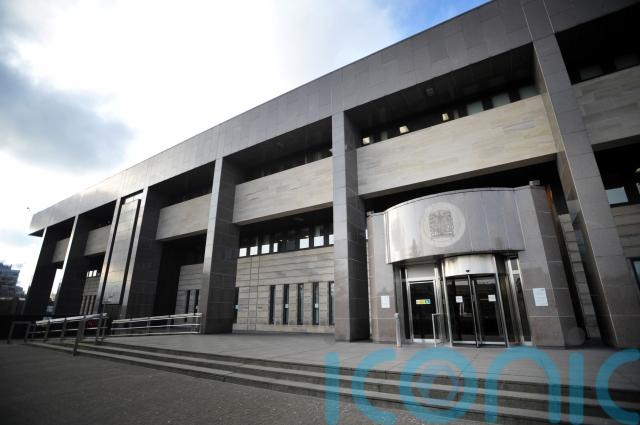
The mother of a three-year-old boy who died of an infection at a Glasgow hospital has said “there is never a day” when she does not think of her son.
Archie Donald died on November 20, 2019 at the Royal Hospital for Children (RHC) in Glasgow after suffering from an infection.
A fatal accident inquiry (FAI) into Archie’s death got under way at Glasgow Sheriff Court on Monday.
In a statement read out at the FAI, Archie’s mother Caitlin Donald said: “There is never a day that I wake up and don’t think of my happy, cheeky, smart little boy.
“I think about my son constantly. What kind of eight year-old boy he would be now and who he would have become in the future?
“He was a bright light in not only my life but also my family’s life and everyone who got to know him.”
The inquiry heard that Archie, who was born on July 22 2016, suffered from congenital nephritic syndrome (CNS), a chronic kidney condition that required ongoing medical treatment, and, in 2017, the removal of his left kidney.
The inquiry was told that as well as having regular outpatient appointments, Archie was also admitted to hospital with illnesses on multiple occasions.
These included four occasions because of infections in the intravenous line with which he had been fitted, to make it easier to administer medication and take blood samples.
Archie attended hospital on two occasions in the month leading up to his last admission, once for a respiratory tract infection on October 22-24, and then for a routine outpatient appointment on November 5.
On both occasions, the inquiry heard, clinical staff did not suspect the bacterial endocarditis infection that a post-mortem later identified as the cause of death.
Dr Heather Maxwell, who was a consultant paediatric nephrologist at RHC who examined Archie on November 5, told the inquiry she had been “worried” about his kidney function but that she did not have any specific concern about his health.
She told the inquiry: “I was worried about his renal function. I was aware he wasn’t quite himself.”
She added: “I felt there was enough in what I had heard and what I had seen to explain that.”
She told the inquiry that a blood test had shown Archie had a deteriorating kidney function and low haemoglobin levels, and that she made a number of changes to his medication on November 5 as a result.
However, she admitted that she failed to spot the raised C-reactive protein (CRP) level in the test results which would have indicated a possible infection.

Visibly upset, she told the inquiry: “I had it in my mind that CRP was unremarkable. That was my error and I was horrified that I didn’t (check it).
“I consider myself a careful and cautious doctor, and I thought I had done everything, I thought I had seen all of his results and I was horrified that despite the system we had in place that happened.”
When asked what she would have done differently if she had spotted the CRP figure, she said she would have asked to see him again sooner for more tests.
She added she would not have immediately linked it to bacterial endocarditis, which she said was “a rare condition in children who have structurally normal parts”.
The inquiry heard that Archie was admitted to hospital for the final time on November 19, when he attended his next outpatient appointment.
Dr Maxwell said that when she examined Archie at 10.15am that day he looked “very pale” and that he had a “loud murmur” on his heart.
The inquiry heard she arranged for urgent blood tests and decided to admit Archie for a echocardiogram (ECHO) test for possible bacterial endocarditis.
However, the inquiry heard there was no bed available on the renal ward and Archie and his mother had to wait in the outpatient department until 7.15pm when one became free, by which time Archie was running a temperature of 38.3 and had high blood pressure.
The ECHO test was also delayed until the next day.
The inquiry heard that Archie’s condition fluctuated over the next few hours.
At 8.30pm, Archie was recorded as still having a temperature but “sitting up, alert, and watching an iPad,” and that at 10.30pm he was asleep with his mother at his side, and deemed to be “haemodynamically stable”.
However in the early hours of November 20 he was found to be unsettled, to be “grunting” while breathing, and with a heart rate of between 160-178 beats per minute.
The inquiry heard that at 3.25am his mother pressed the emergency buzzer due to Archie vomiting and that at 3.36am she pressed the buzzer again as he had stopped breathing.
Attempts to resuscitate him failed and life was pronounced extinct at 4.36am.
The inquiry heard a post-mortem examination report identified the cause of death as: “Subacute bacterial endocarditis with extensive associated myocardial infarction in a child with chronic renal failure due to congenital nephrotic syndrome.”
In her statement Archie’s mother said it was “harder” to understand how her son died of a preventable infection rather than CNS.
“I blame myself every day for not pushing the doctors to investigate his deterioration more,” her statement read.
“I knew something was not right with my son, but I trusted the staff and the hospital, as they had treated Archie from the age of six weeks old.”
Her statement added: “If someone had recognised that Archie actually had an infection sooner, there is a chance my son would still be alive today.”
The inquiry before Sheriff Thomas Millar continues.
Subscribe or register today to discover more from DonegalLive.ie
Buy the e-paper of the Donegal Democrat, Donegal People's Press, Donegal Post and Inish Times here for instant access to Donegal's premier news titles.
Keep up with the latest news from Donegal with our daily newsletter featuring the most important stories of the day delivered to your inbox every evening at 5pm.